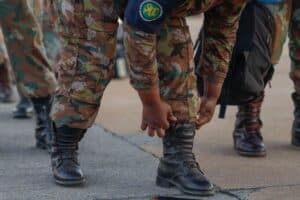While we relax this festive season, let’s remember the brave SANDF soldiers who defend our borders and sacrifice their time for our safety.

I recently had the privilege of accompanying the media on a tour to visit our troops deployed as part of Operation Corona, guarding our borders.
The South African National Defence Force (SANDF) tries to hold at least two of these trips a year to what has become the military’s longest running operation since it was launched in 2009.
Safeguarding the territorial integrity of the republic is a constitutional mandate of the SANDF.
This year we travelled north to Musina on the border with Zimbabwe and we have also been to Ladybrand on the border with Lesotho.
In fact, we have multiple places we can take journalists to because South Africa’s land border is more than 4 471km long, from the mouth of the Orange River disgorging into the Atlantic on the west, across the bottom of Namibia, around Botswana to Zimbabwe and then down past Mozambique.
Let’s not forget the borders we have with eSwatini and Lesotho.
ALSO READ: Control SANDF soldiers or face the fallout
We also have maritime borders, our coastline, to guard.
That’s just Operation Corona an internal operation.
We also have members in the Democratic Republic of Congo and until recently we had members in northern Mozambique, as part of the SADC Mission called Samim (SADC Mission in Mozambique) combating the threat of the Islamic State (IS)-backed insurgency in Cabo Delgado.
The SANDF also has soldiers deployed internally on a variety of roles from humanitarian, whether medical or water purification, and bridge building, to interagency support with the SAPS.
It’s what this defence force does, in support of the state departments, with a diminishing budget.
I am struck when I meet the soldiers in the field at their sense of purpose, patriotism and commitment. It’s not easy, even less so at a time like this when the rest of the country is taking time off. You and I will be spending time with our loved ones, kicking back around an open fire with a drink in our hands or building sandcastles on the beach.
ALSO READ: Motshekga dismisses allegations of ‘rampant ill-disciple’ in SANDF
The men and women of the SANDF are doing the opposite.
The price of freedom is eternal vigilance. Our freedom depends on securing the borders, not just from military threats, but everything else.
In terms of Operation Corona, the SANDF’s job is to maintain a 10km wide cordon sanitaire between the land border and the rest of the country.
The SANDF is the last line of defence when it comes to people trying to leave the country illegally, normally with ill-gotten gains driving stolen vehicles over rough terrain, crashing the lead bakkie to make a hole for the others to follow – or leading stolen livestock over the line.
In other cases, the SANDF is the first line of defence as people try to enter the country illegally, or criminal syndicates try to smuggle counterfeit goods and drugs across the border for sale in South Africa.
The results of Operation Corona speak for themselves. There is not a week that goes by without significant successes being reported in the media.
ALSO READ: SANDF says pregnant women entering South Africa illegally to secure grants
It is not an easy job by any stretch of the imagination as anyone who has been on the northern border line from the Limpopo valley up the hills and beyond the confluence of the Shashe and Limpopo Rivers to the west, or eastwards towards the meeting of Mozambique and Zimbabwe, will attest.
Our other borders are much the same. Hot, unimaginably so at a time when Gauteng is sweltering under a heatwave, with a terrain that is hard on tyres and boots.
These soldiers have to patrol, many on foot, in combat gear; carrying kilograms of equipment on their backs, their as sault weapons, ammunition, radios, food and their water.
They do it every day, deployed under combat conditions in the field, sleeping rough at night for two weeks on, before being rotated to the forward base for a week as the reserve force, ready to deploy at a moment’s notice should the conditions demand it.
Most of the soldiers used in Operation Corona are reservists, it’s not their full-time job.
We don’t hear about them. We don’t think about them, but the reason that they are there along the watchtower allows us to sleep safely in our beds at night.
ALSO READ: 1 100 soldiers deployed to help fight illegal mining
The criminal syndicates are armed and dangerous. And then there are wild animals.
On our eastern border, the Operation Corona companies are deployed literally in the middle of a game park where they have to contend with the big five and poachers.
It’s not fashionable to think of the infanteers or the dismounted gunners and troopers toiling up and down the hills, but their lives are a lot different from ours.
At midnight on 31 December, we will celebrate the dawn of the New Year with fire crackers, but where our soldiers are, a 1 000ft flare illuminating the night sky will mean something else altogether and the sound of explosions won’t have them shaking each other’s hands, but reaching for the kit and going into action.
So, this festive season, let’s spare a thought for the men and women who gave up their time with family and friends so that we could enjoy ours.
Let’s thank them for their service and willingness to sacrifice creature comforts and even life itselfand push for them to be acknowledged and better looked after in 2025 so that they can continue to do what they do even better.
Support Local Journalism
Add The Citizen as a Preferred Source on Google and follow us on Google News to see more of our trusted reporting in Google News and Top Stories.






